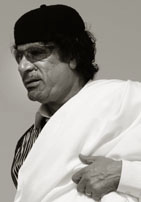|
dailynews |
|
|
|
|
|
OTHER LINKS |

|

|

|
The US-Libyan thaw and the stepped-up wealth drive
Considering that the Libyan standoff with the US has been decades-long and suffused with a high ideological content, the decision by Libya to adopt a more cooperative stance in its relations with its hitherto arch foe in the West, over its "weapons program", could be considered both remarkable and thought-provoking. Is this a stark indication that the Dollar is indeed always driving the global political economy? Does a state's ideological armour crumble under economic compulsions? These are just two issues which the US-Libya rapprochement throws-up.
Thus far, nuclear weapons have been considered an important component of national power. The states which acquire such weaponry are seen as joining an elite band of states which prove a considerable formative influence on the global political economy. This is the reason why India is seen as a predominant Asian power today along with China. Its explosion of a nuclear device in 1998 ensured this coveted big power status for India. Nuclear power along with growing economic clout have propelled India to this prized niche among states but what is one to make of Libya's decision to abide by US directives on the nuclear issue? Has not Libya renounced the opportunity to rise in the global power hierarchy by pledging to scrap its "weapons of mass destruction programs"? The key to unravelling the conundrum is Libya's need for foreign investment in its oil and gas industry. Reports said that the restoration of US-Libyan diplomatic relations paved the way for US companies, such as, Marathon Oil Corp, Conoco Phillips and Amerada Hess Corp., to restart oil and gas production in Libya after a 19-year lapse. It seems then that improved economic prospects coming in the wake of stepped-up foreign investments are inducing Libya to give-up the nuclear programs option, which has hitherto been seen by analysts as essential for big power status. Economics - in other words - drives politics. Referring to defrosting US-Libyan ties in 2003, US Secretary of State Condoleezza Rice was quoted saying recently that. "Just as 2003 marked a turning point for the Libyan people, so too could 2006 mark turning points for the peoples of Iran and North Korea" - two states with which the US is currently embroiled in nuclear disputes. If our premise that economics drives politics proves undisputable, North Korea could be expected to throw in the towel in its nuclear dispute with the West but the same could not be easily predicted of Iran which is a major oil power and is in economic terms, on a firmer footing than North Korea. Iran would be a hard nut to crack in this dispute and costly concessions would be needed to be made by the West if Iran is to be made to fully adhere to the current global, nuclear non-proliferation regime. While economic success continues to be a prime preoccupation of states, and Libya could be said to be guided by the same consideration, Venezuelan President Hugo Chavez is quoted as repeatedly pointing to an important but often forgotten dimension in the development debate by announcing plans to sell cheap oil to the poor of the West. This is an important corrective to the current lop-sided focus on economic growth, which is often secured at the expense of economic equity. The Venezuelan President's overtures to the poor press home the point that present "development paradigms" often leave the poor out in the cold. The stark truth is that the wealth gap everywhere is widening, as long as states enthrone growth at the cost of distributive justice. Hopefully developing countries such as Libya would revisit the debate on correct development models even as they explore quick-fixes to economic want. |
![[Global Scrutiny]](Global%20Scrutiny.jpg) NUCLEAR ISSUE: The restoration of US-Libyan diplomatic relations
provides fresh proof that in the current world order economics drives
politics.
NUCLEAR ISSUE: The restoration of US-Libyan diplomatic relations
provides fresh proof that in the current world order economics drives
politics. 







